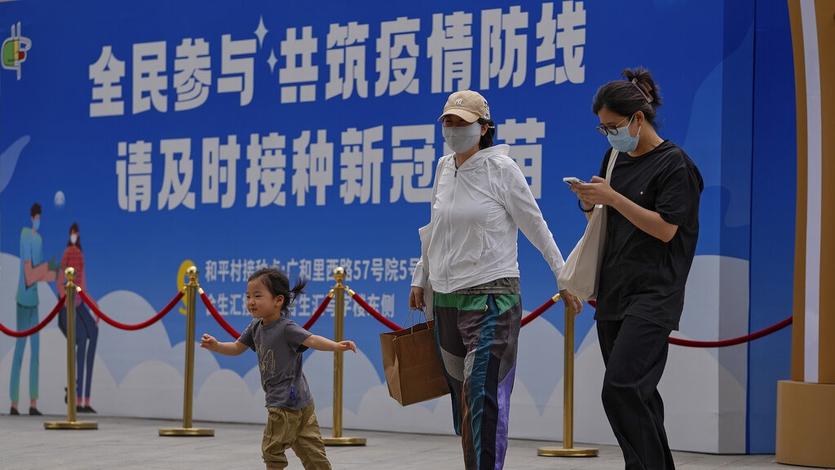 Women wearing face masks to help curb the spread of the coronavirus and a child walk by a billboard calling on people to get vaccinated against COVID-19 outside a hopping mall in Beijing, capital of China, on May 24, 2021. (ANDY WONG / AP)
Women wearing face masks to help curb the spread of the coronavirus and a child walk by a billboard calling on people to get vaccinated against COVID-19 outside a hopping mall in Beijing, capital of China, on May 24, 2021. (ANDY WONG / AP)
Sinopharm's COVID-19 vaccine has been approved for emergency use for young people ages 3 to 17, after early and midstage clinical trials showed it is safe and can elicit strong immune responses in the age group, the company said in a recent statement.
The approval was granted by the Joint Prevention and Control Mechanism of the State Council, which was set up to deal with the COVID-19 pandemic.
It is the second domestic COVID-19 vaccine made available for children and teenagers in China following the authorization for emergency use of Sinovac's shot in June
It is the second domestic COVID-19 vaccine made available for children and teenagers in China. In June, Sinovac Biotech's vaccine was authorized for emergency use for young people.
Sinopharm said in a statement released on Friday that it had completed the first and second stages of clinical trials in Henan province on people ages 3 to 17, which showed their vaccine was effective and safe.
All trial participants had generated antibodies to tackle the virus after receiving two doses. There were no significant differences in the strength of their immunity when compared with adult counterparts.
The vaccine showed good safety and no severe adverse effects had been recorded, the company said.
ALSO READ: China to extend mass vaccination program to minors aged 12-17
"We began clinical trials among adolescents by first testing 13- to 17-year-olds, then proceeding to 6-to 12-year-olds and 3- to 5-year-olds, so as to guarantee safety," said Zhang Yuntao, chief scientist and vice-president of Sinopharm's China National Biotech Group, during an interview with China National Radio.
The company said it also launched a study in Abu Dhabi in the United Arab Emirates on June 6, to evaluate the vaccine's efficacy in a group of 900 people of different nationalities ages 3 to 17.
Vaccinating children and teens is essential to building an immunity barrier against the virus, Zhang Yuntao, chief scientist and vice-president of Sinopharm's China National Biotech Group, said
Vaccinating children and teens is essential to building an immunity barrier against the virus, Zhang said. Young people's immune systems are still developing, so researchers are careful when involving them in clinical trials, he said.
Zhang said it will likely take another year for the vaccine to receive full market approval from the nation's top drug regulator for use in younger people.
Sinovac also reported encouraging results from the first and second stage clinical trials of its vaccine on 552 people ages 3 to 17 in Hebei province, conducted from October to December.
Proved effective
According to results published in The Lancet medical journal in late June, its vaccine had elicited antibody responses in over 96 percent of trial participants, on par with the rate in trials involving adults.
READ MORE: Chinese inactivated vaccines 'effective against COVID-19'
Liu Peicheng, a spokesman for Sinovac, said the vaccines administered to children and teens are identical to those delivered to adults. "There is no need to take extra precautions when inoculating children," he added.
Last week, several cities in the Guangxi Zhuang autonomous region and Fujian and Hebei provinces announced they will begin administering COVID-19 vaccines to teenagers ages 12 to 17, with some cities saying they will complete the inoculations by the end of September or October.
Since then, more than a dozen provincial-level regions have announced similar plans.
Beijing is taking surveys and rolling out publicity campaigns in preparation for the start of its vaccination program for teenagers after September, community workers told the newspaper Health Times.


